Nursing Report: Exploring Parental Choices in Early Education
VerifiedAdded on 2023/06/04
|15
|4249
|470
Report
AI Summary
This nursing report investigates the factors influencing parental decisions when selecting early education facilities for their children. The research, based on interviews and questionnaires with 30 parents (all female), explores key themes such as parental engagement, early childhood learning, and holistic development. The study highlights the importance of factors like parental involvement, accessibility, curriculum, and the desire for children's social and emotional growth. The findings reveal that maternal priorities, including the need to return to work and the desire for enhanced academic and social skills for their children, play a crucial role in the decision-making process. Limitations include the focus on maternal perspectives and the lack of consideration for fathers' decisions and the impact of siblings. The report also notes the influence of parents' age and career stability on their choices, with a selection bias due to the age distribution of the participants. The research provides valuable insights into the complex factors that shape parental choices in early childhood education and their impact on child development.
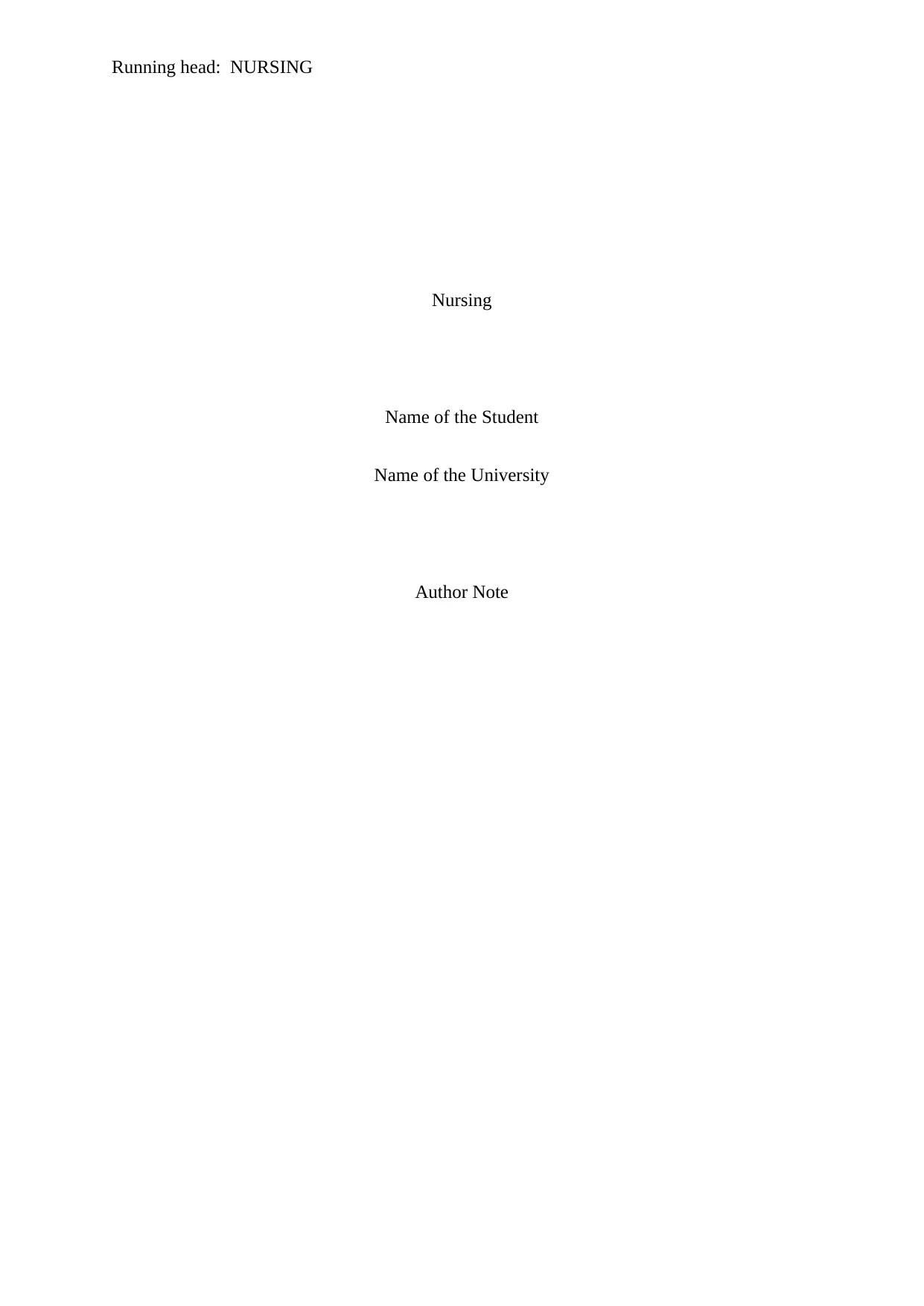
Running head: NURSING
Nursing
Name of the Student
Name of the University
Author Note
Nursing
Name of the Student
Name of the University
Author Note
Paraphrase This Document
Need a fresh take? Get an instant paraphrase of this document with our AI Paraphraser
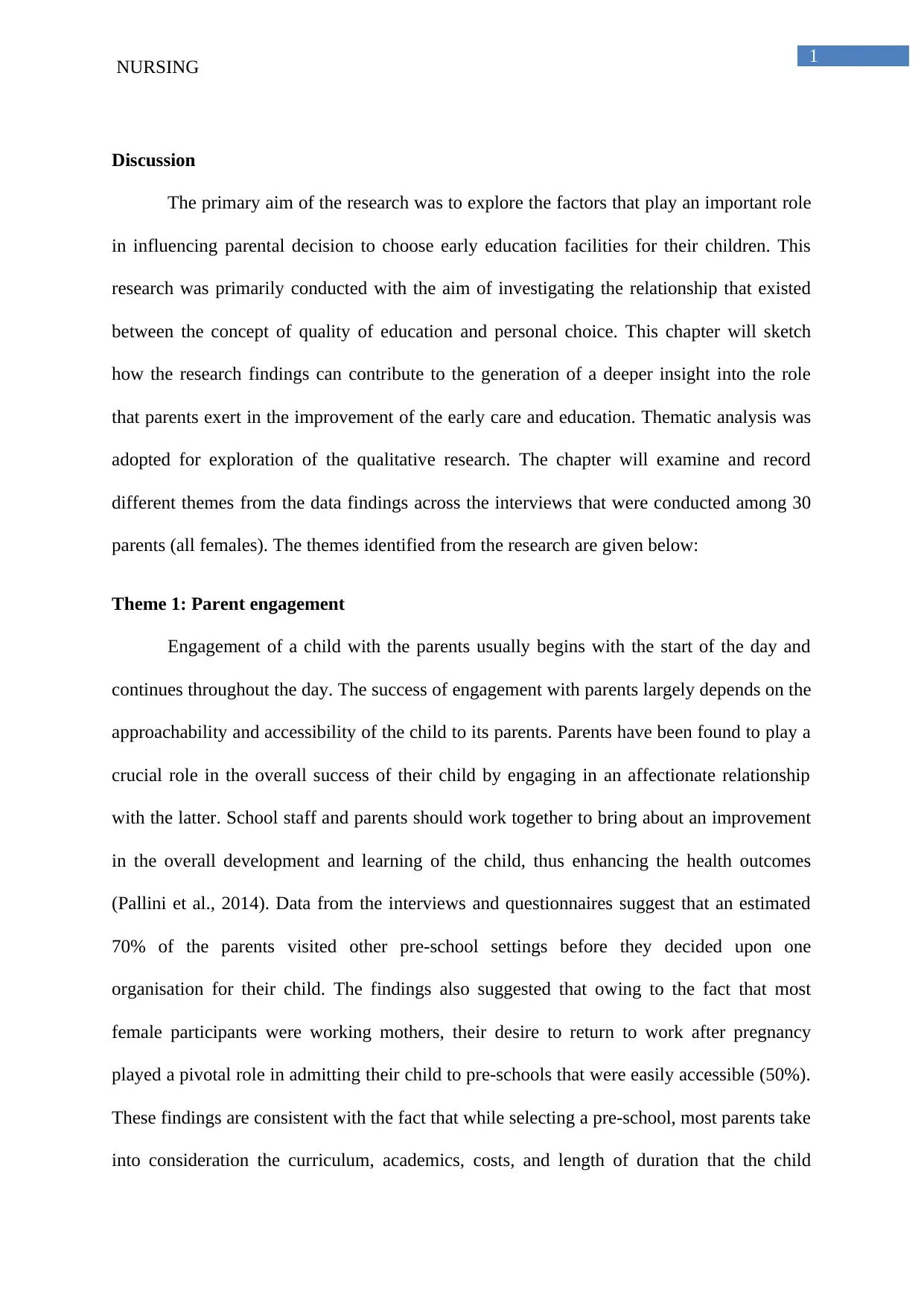
1
NURSING
Discussion
The primary aim of the research was to explore the factors that play an important role
in influencing parental decision to choose early education facilities for their children. This
research was primarily conducted with the aim of investigating the relationship that existed
between the concept of quality of education and personal choice. This chapter will sketch
how the research findings can contribute to the generation of a deeper insight into the role
that parents exert in the improvement of the early care and education. Thematic analysis was
adopted for exploration of the qualitative research. The chapter will examine and record
different themes from the data findings across the interviews that were conducted among 30
parents (all females). The themes identified from the research are given below:
Theme 1: Parent engagement
Engagement of a child with the parents usually begins with the start of the day and
continues throughout the day. The success of engagement with parents largely depends on the
approachability and accessibility of the child to its parents. Parents have been found to play a
crucial role in the overall success of their child by engaging in an affectionate relationship
with the latter. School staff and parents should work together to bring about an improvement
in the overall development and learning of the child, thus enhancing the health outcomes
(Pallini et al., 2014). Data from the interviews and questionnaires suggest that an estimated
70% of the parents visited other pre-school settings before they decided upon one
organisation for their child. The findings also suggested that owing to the fact that most
female participants were working mothers, their desire to return to work after pregnancy
played a pivotal role in admitting their child to pre-schools that were easily accessible (50%).
These findings are consistent with the fact that while selecting a pre-school, most parents take
into consideration the curriculum, academics, costs, and length of duration that the child
NURSING
Discussion
The primary aim of the research was to explore the factors that play an important role
in influencing parental decision to choose early education facilities for their children. This
research was primarily conducted with the aim of investigating the relationship that existed
between the concept of quality of education and personal choice. This chapter will sketch
how the research findings can contribute to the generation of a deeper insight into the role
that parents exert in the improvement of the early care and education. Thematic analysis was
adopted for exploration of the qualitative research. The chapter will examine and record
different themes from the data findings across the interviews that were conducted among 30
parents (all females). The themes identified from the research are given below:
Theme 1: Parent engagement
Engagement of a child with the parents usually begins with the start of the day and
continues throughout the day. The success of engagement with parents largely depends on the
approachability and accessibility of the child to its parents. Parents have been found to play a
crucial role in the overall success of their child by engaging in an affectionate relationship
with the latter. School staff and parents should work together to bring about an improvement
in the overall development and learning of the child, thus enhancing the health outcomes
(Pallini et al., 2014). Data from the interviews and questionnaires suggest that an estimated
70% of the parents visited other pre-school settings before they decided upon one
organisation for their child. The findings also suggested that owing to the fact that most
female participants were working mothers, their desire to return to work after pregnancy
played a pivotal role in admitting their child to pre-schools that were easily accessible (50%).
These findings are consistent with the fact that while selecting a pre-school, most parents take
into consideration the curriculum, academics, costs, and length of duration that the child
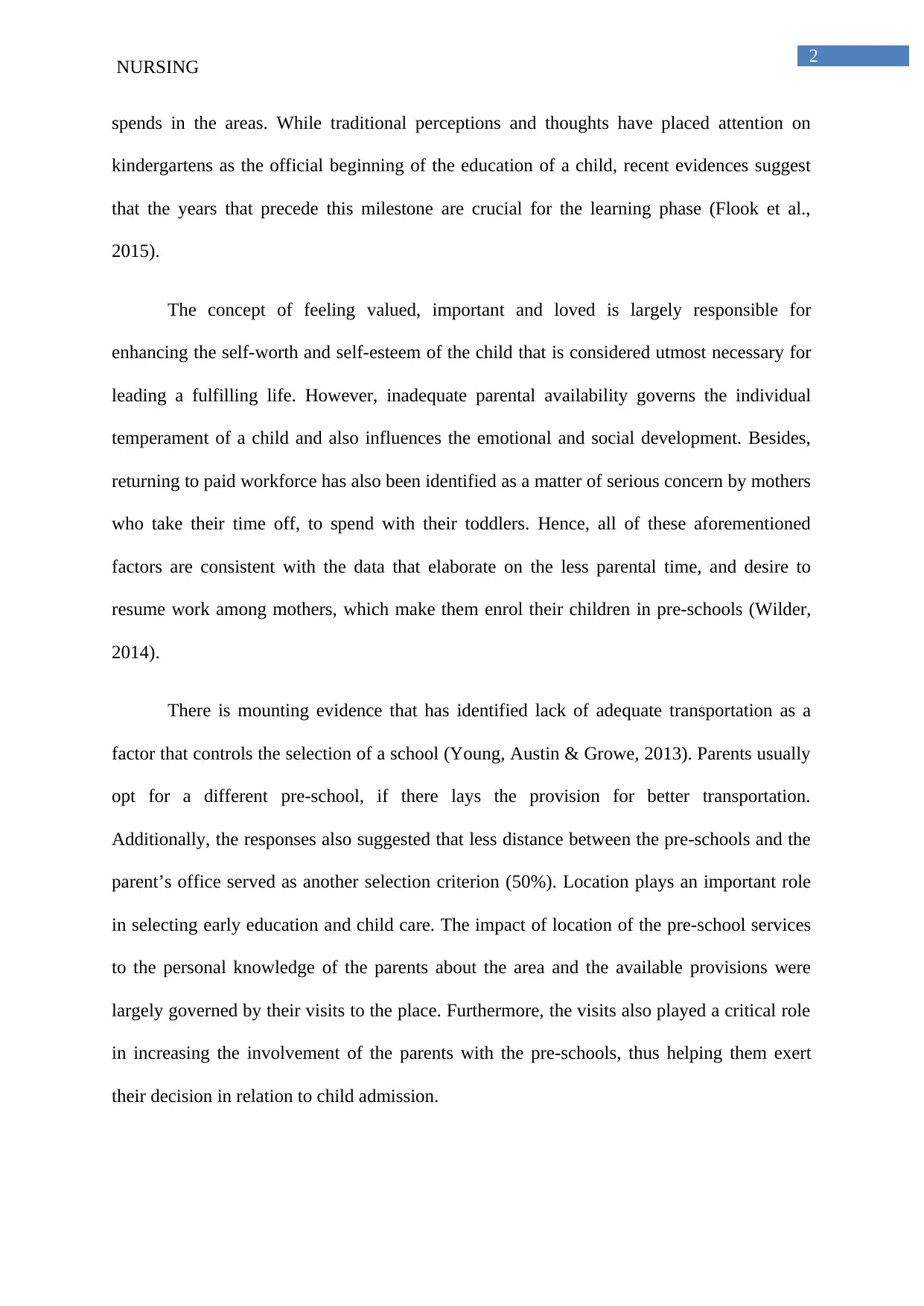
2
NURSING
spends in the areas. While traditional perceptions and thoughts have placed attention on
kindergartens as the official beginning of the education of a child, recent evidences suggest
that the years that precede this milestone are crucial for the learning phase (Flook et al.,
2015).
The concept of feeling valued, important and loved is largely responsible for
enhancing the self-worth and self-esteem of the child that is considered utmost necessary for
leading a fulfilling life. However, inadequate parental availability governs the individual
temperament of a child and also influences the emotional and social development. Besides,
returning to paid workforce has also been identified as a matter of serious concern by mothers
who take their time off, to spend with their toddlers. Hence, all of these aforementioned
factors are consistent with the data that elaborate on the less parental time, and desire to
resume work among mothers, which make them enrol their children in pre-schools (Wilder,
2014).
There is mounting evidence that has identified lack of adequate transportation as a
factor that controls the selection of a school (Young, Austin & Growe, 2013). Parents usually
opt for a different pre-school, if there lays the provision for better transportation.
Additionally, the responses also suggested that less distance between the pre-schools and the
parent’s office served as another selection criterion (50%). Location plays an important role
in selecting early education and child care. The impact of location of the pre-school services
to the personal knowledge of the parents about the area and the available provisions were
largely governed by their visits to the place. Furthermore, the visits also played a critical role
in increasing the involvement of the parents with the pre-schools, thus helping them exert
their decision in relation to child admission.
NURSING
spends in the areas. While traditional perceptions and thoughts have placed attention on
kindergartens as the official beginning of the education of a child, recent evidences suggest
that the years that precede this milestone are crucial for the learning phase (Flook et al.,
2015).
The concept of feeling valued, important and loved is largely responsible for
enhancing the self-worth and self-esteem of the child that is considered utmost necessary for
leading a fulfilling life. However, inadequate parental availability governs the individual
temperament of a child and also influences the emotional and social development. Besides,
returning to paid workforce has also been identified as a matter of serious concern by mothers
who take their time off, to spend with their toddlers. Hence, all of these aforementioned
factors are consistent with the data that elaborate on the less parental time, and desire to
resume work among mothers, which make them enrol their children in pre-schools (Wilder,
2014).
There is mounting evidence that has identified lack of adequate transportation as a
factor that controls the selection of a school (Young, Austin & Growe, 2013). Parents usually
opt for a different pre-school, if there lays the provision for better transportation.
Additionally, the responses also suggested that less distance between the pre-schools and the
parent’s office served as another selection criterion (50%). Location plays an important role
in selecting early education and child care. The impact of location of the pre-school services
to the personal knowledge of the parents about the area and the available provisions were
largely governed by their visits to the place. Furthermore, the visits also played a critical role
in increasing the involvement of the parents with the pre-schools, thus helping them exert
their decision in relation to child admission.
⊘ This is a preview!⊘
Do you want full access?
Subscribe today to unlock all pages.

Trusted by 1+ million students worldwide
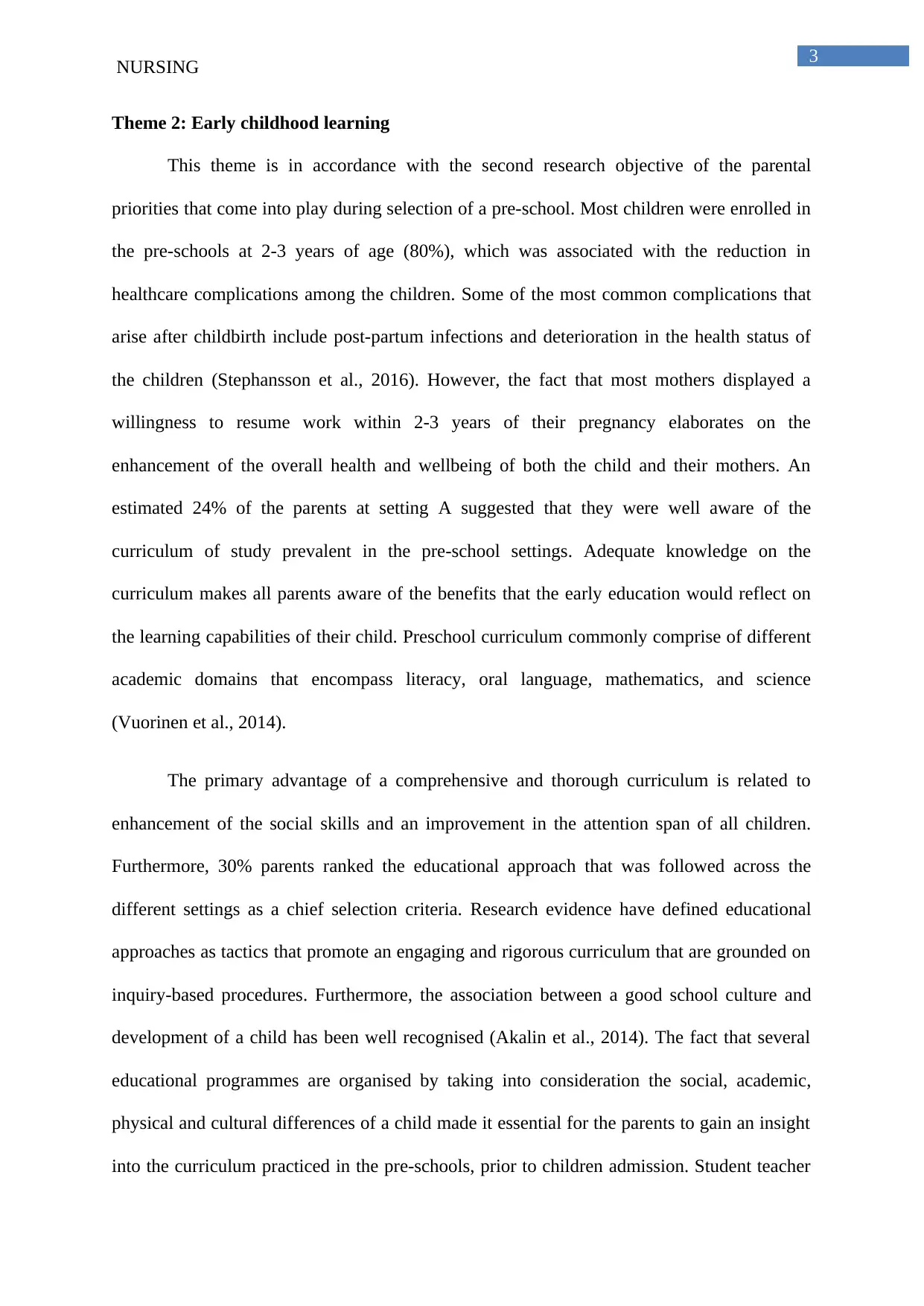
3
NURSING
Theme 2: Early childhood learning
This theme is in accordance with the second research objective of the parental
priorities that come into play during selection of a pre-school. Most children were enrolled in
the pre-schools at 2-3 years of age (80%), which was associated with the reduction in
healthcare complications among the children. Some of the most common complications that
arise after childbirth include post-partum infections and deterioration in the health status of
the children (Stephansson et al., 2016). However, the fact that most mothers displayed a
willingness to resume work within 2-3 years of their pregnancy elaborates on the
enhancement of the overall health and wellbeing of both the child and their mothers. An
estimated 24% of the parents at setting A suggested that they were well aware of the
curriculum of study prevalent in the pre-school settings. Adequate knowledge on the
curriculum makes all parents aware of the benefits that the early education would reflect on
the learning capabilities of their child. Preschool curriculum commonly comprise of different
academic domains that encompass literacy, oral language, mathematics, and science
(Vuorinen et al., 2014).
The primary advantage of a comprehensive and thorough curriculum is related to
enhancement of the social skills and an improvement in the attention span of all children.
Furthermore, 30% parents ranked the educational approach that was followed across the
different settings as a chief selection criteria. Research evidence have defined educational
approaches as tactics that promote an engaging and rigorous curriculum that are grounded on
inquiry-based procedures. Furthermore, the association between a good school culture and
development of a child has been well recognised (Akalin et al., 2014). The fact that several
educational programmes are organised by taking into consideration the social, academic,
physical and cultural differences of a child made it essential for the parents to gain an insight
into the curriculum practiced in the pre-schools, prior to children admission. Student teacher
NURSING
Theme 2: Early childhood learning
This theme is in accordance with the second research objective of the parental
priorities that come into play during selection of a pre-school. Most children were enrolled in
the pre-schools at 2-3 years of age (80%), which was associated with the reduction in
healthcare complications among the children. Some of the most common complications that
arise after childbirth include post-partum infections and deterioration in the health status of
the children (Stephansson et al., 2016). However, the fact that most mothers displayed a
willingness to resume work within 2-3 years of their pregnancy elaborates on the
enhancement of the overall health and wellbeing of both the child and their mothers. An
estimated 24% of the parents at setting A suggested that they were well aware of the
curriculum of study prevalent in the pre-school settings. Adequate knowledge on the
curriculum makes all parents aware of the benefits that the early education would reflect on
the learning capabilities of their child. Preschool curriculum commonly comprise of different
academic domains that encompass literacy, oral language, mathematics, and science
(Vuorinen et al., 2014).
The primary advantage of a comprehensive and thorough curriculum is related to
enhancement of the social skills and an improvement in the attention span of all children.
Furthermore, 30% parents ranked the educational approach that was followed across the
different settings as a chief selection criteria. Research evidence have defined educational
approaches as tactics that promote an engaging and rigorous curriculum that are grounded on
inquiry-based procedures. Furthermore, the association between a good school culture and
development of a child has been well recognised (Akalin et al., 2014). The fact that several
educational programmes are organised by taking into consideration the social, academic,
physical and cultural differences of a child made it essential for the parents to gain an insight
into the curriculum practiced in the pre-schools, prior to children admission. Student teacher
Paraphrase This Document
Need a fresh take? Get an instant paraphrase of this document with our AI Paraphraser
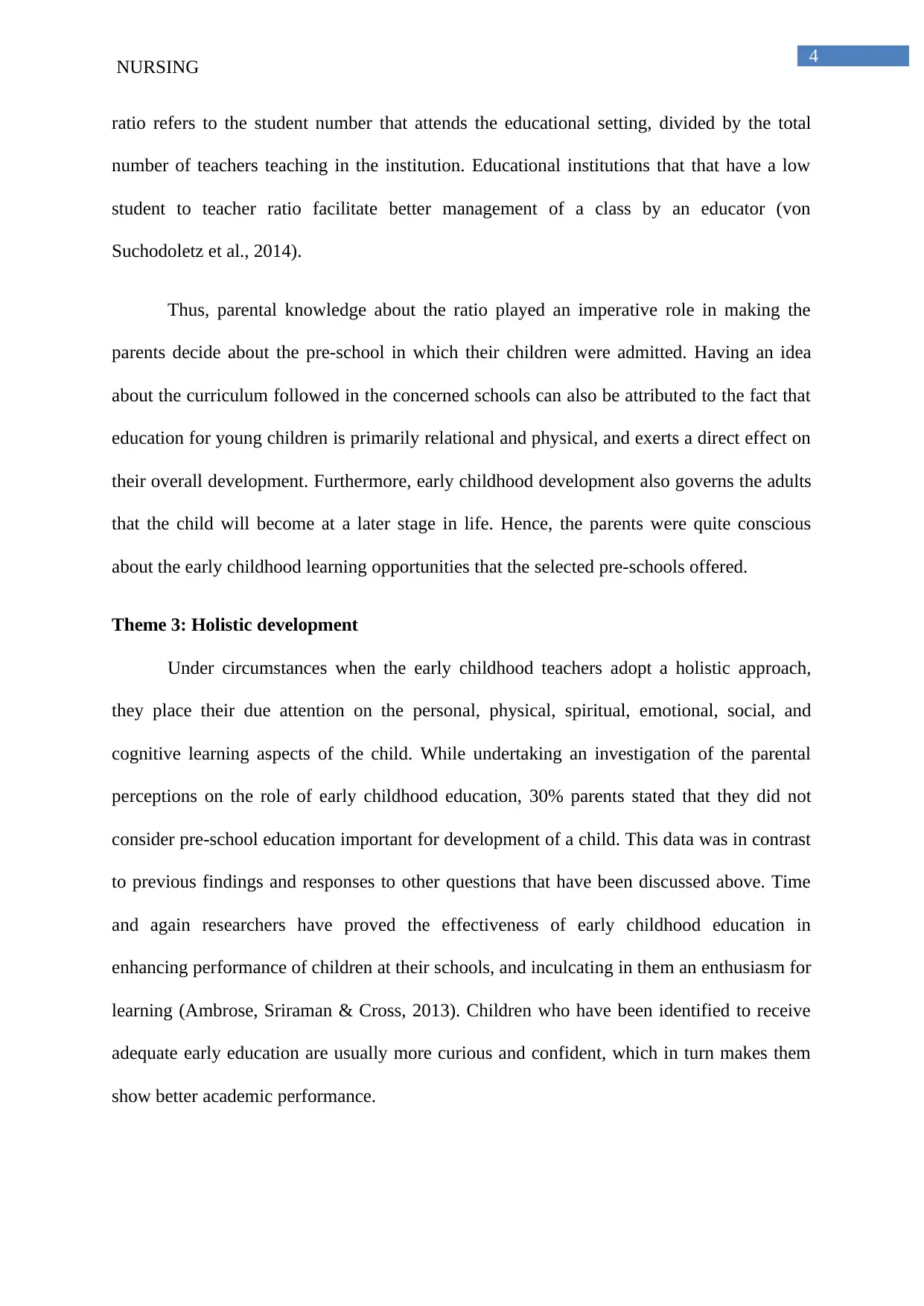
4
NURSING
ratio refers to the student number that attends the educational setting, divided by the total
number of teachers teaching in the institution. Educational institutions that that have a low
student to teacher ratio facilitate better management of a class by an educator (von
Suchodoletz et al., 2014).
Thus, parental knowledge about the ratio played an imperative role in making the
parents decide about the pre-school in which their children were admitted. Having an idea
about the curriculum followed in the concerned schools can also be attributed to the fact that
education for young children is primarily relational and physical, and exerts a direct effect on
their overall development. Furthermore, early childhood development also governs the adults
that the child will become at a later stage in life. Hence, the parents were quite conscious
about the early childhood learning opportunities that the selected pre-schools offered.
Theme 3: Holistic development
Under circumstances when the early childhood teachers adopt a holistic approach,
they place their due attention on the personal, physical, spiritual, emotional, social, and
cognitive learning aspects of the child. While undertaking an investigation of the parental
perceptions on the role of early childhood education, 30% parents stated that they did not
consider pre-school education important for development of a child. This data was in contrast
to previous findings and responses to other questions that have been discussed above. Time
and again researchers have proved the effectiveness of early childhood education in
enhancing performance of children at their schools, and inculcating in them an enthusiasm for
learning (Ambrose, Sriraman & Cross, 2013). Children who have been identified to receive
adequate early education are usually more curious and confident, which in turn makes them
show better academic performance.
NURSING
ratio refers to the student number that attends the educational setting, divided by the total
number of teachers teaching in the institution. Educational institutions that that have a low
student to teacher ratio facilitate better management of a class by an educator (von
Suchodoletz et al., 2014).
Thus, parental knowledge about the ratio played an imperative role in making the
parents decide about the pre-school in which their children were admitted. Having an idea
about the curriculum followed in the concerned schools can also be attributed to the fact that
education for young children is primarily relational and physical, and exerts a direct effect on
their overall development. Furthermore, early childhood development also governs the adults
that the child will become at a later stage in life. Hence, the parents were quite conscious
about the early childhood learning opportunities that the selected pre-schools offered.
Theme 3: Holistic development
Under circumstances when the early childhood teachers adopt a holistic approach,
they place their due attention on the personal, physical, spiritual, emotional, social, and
cognitive learning aspects of the child. While undertaking an investigation of the parental
perceptions on the role of early childhood education, 30% parents stated that they did not
consider pre-school education important for development of a child. This data was in contrast
to previous findings and responses to other questions that have been discussed above. Time
and again researchers have proved the effectiveness of early childhood education in
enhancing performance of children at their schools, and inculcating in them an enthusiasm for
learning (Ambrose, Sriraman & Cross, 2013). Children who have been identified to receive
adequate early education are usually more curious and confident, which in turn makes them
show better academic performance.
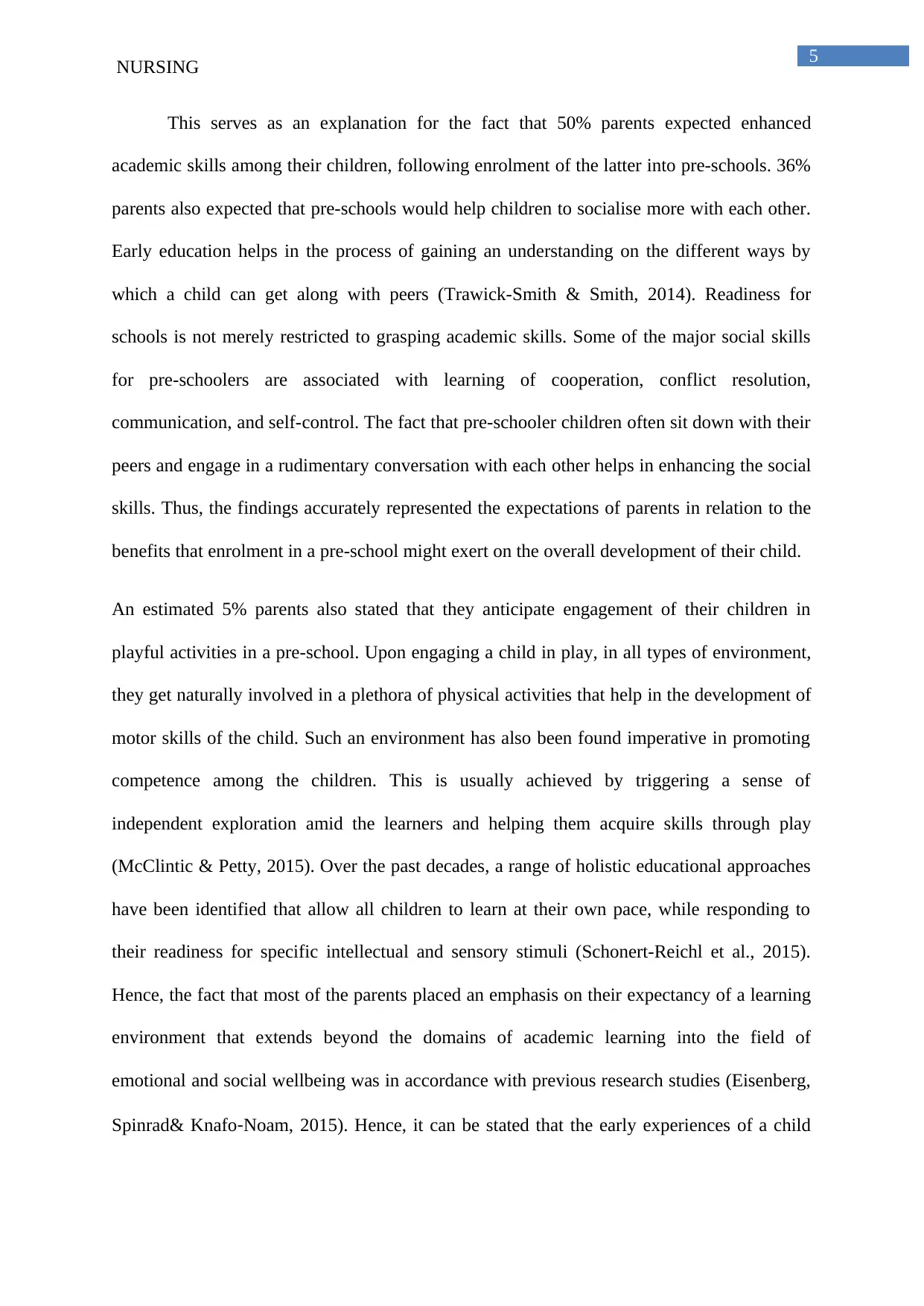
5
NURSING
This serves as an explanation for the fact that 50% parents expected enhanced
academic skills among their children, following enrolment of the latter into pre-schools. 36%
parents also expected that pre-schools would help children to socialise more with each other.
Early education helps in the process of gaining an understanding on the different ways by
which a child can get along with peers (Trawick-Smith & Smith, 2014). Readiness for
schools is not merely restricted to grasping academic skills. Some of the major social skills
for pre-schoolers are associated with learning of cooperation, conflict resolution,
communication, and self-control. The fact that pre-schooler children often sit down with their
peers and engage in a rudimentary conversation with each other helps in enhancing the social
skills. Thus, the findings accurately represented the expectations of parents in relation to the
benefits that enrolment in a pre-school might exert on the overall development of their child.
An estimated 5% parents also stated that they anticipate engagement of their children in
playful activities in a pre-school. Upon engaging a child in play, in all types of environment,
they get naturally involved in a plethora of physical activities that help in the development of
motor skills of the child. Such an environment has also been found imperative in promoting
competence among the children. This is usually achieved by triggering a sense of
independent exploration amid the learners and helping them acquire skills through play
(McClintic & Petty, 2015). Over the past decades, a range of holistic educational approaches
have been identified that allow all children to learn at their own pace, while responding to
their readiness for specific intellectual and sensory stimuli (Schonert-Reichl et al., 2015).
Hence, the fact that most of the parents placed an emphasis on their expectancy of a learning
environment that extends beyond the domains of academic learning into the field of
emotional and social wellbeing was in accordance with previous research studies (Eisenberg,
Spinrad& Knafo‐Noam, 2015). Hence, it can be stated that the early experiences of a child
NURSING
This serves as an explanation for the fact that 50% parents expected enhanced
academic skills among their children, following enrolment of the latter into pre-schools. 36%
parents also expected that pre-schools would help children to socialise more with each other.
Early education helps in the process of gaining an understanding on the different ways by
which a child can get along with peers (Trawick-Smith & Smith, 2014). Readiness for
schools is not merely restricted to grasping academic skills. Some of the major social skills
for pre-schoolers are associated with learning of cooperation, conflict resolution,
communication, and self-control. The fact that pre-schooler children often sit down with their
peers and engage in a rudimentary conversation with each other helps in enhancing the social
skills. Thus, the findings accurately represented the expectations of parents in relation to the
benefits that enrolment in a pre-school might exert on the overall development of their child.
An estimated 5% parents also stated that they anticipate engagement of their children in
playful activities in a pre-school. Upon engaging a child in play, in all types of environment,
they get naturally involved in a plethora of physical activities that help in the development of
motor skills of the child. Such an environment has also been found imperative in promoting
competence among the children. This is usually achieved by triggering a sense of
independent exploration amid the learners and helping them acquire skills through play
(McClintic & Petty, 2015). Over the past decades, a range of holistic educational approaches
have been identified that allow all children to learn at their own pace, while responding to
their readiness for specific intellectual and sensory stimuli (Schonert-Reichl et al., 2015).
Hence, the fact that most of the parents placed an emphasis on their expectancy of a learning
environment that extends beyond the domains of academic learning into the field of
emotional and social wellbeing was in accordance with previous research studies (Eisenberg,
Spinrad& Knafo‐Noam, 2015). Hence, it can be stated that the early experiences of a child
⊘ This is a preview!⊘
Do you want full access?
Subscribe today to unlock all pages.

Trusted by 1+ million students worldwide
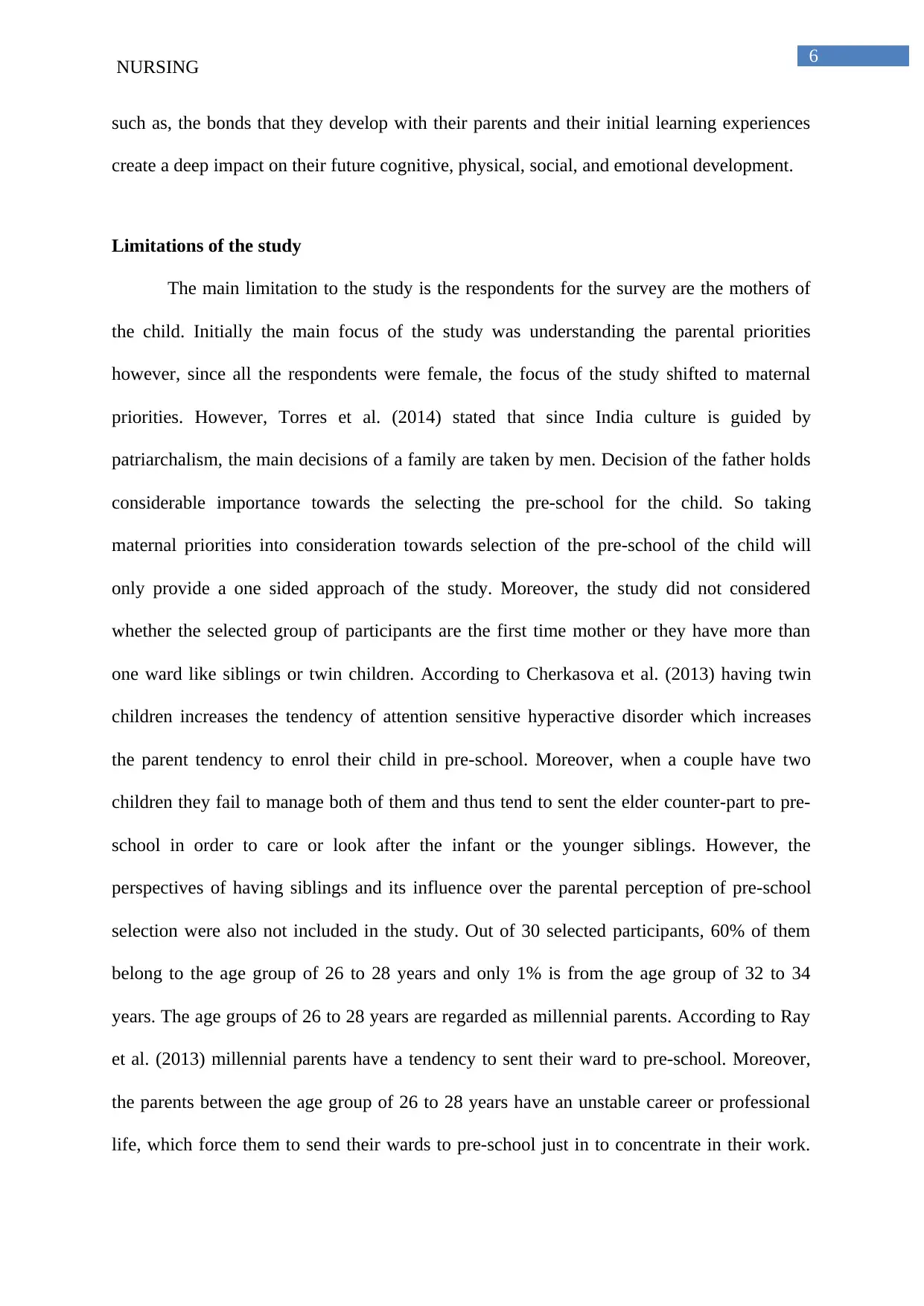
6
NURSING
such as, the bonds that they develop with their parents and their initial learning experiences
create a deep impact on their future cognitive, physical, social, and emotional development.
Limitations of the study
The main limitation to the study is the respondents for the survey are the mothers of
the child. Initially the main focus of the study was understanding the parental priorities
however, since all the respondents were female, the focus of the study shifted to maternal
priorities. However, Torres et al. (2014) stated that since India culture is guided by
patriarchalism, the main decisions of a family are taken by men. Decision of the father holds
considerable importance towards the selecting the pre-school for the child. So taking
maternal priorities into consideration towards selection of the pre-school of the child will
only provide a one sided approach of the study. Moreover, the study did not considered
whether the selected group of participants are the first time mother or they have more than
one ward like siblings or twin children. According to Cherkasova et al. (2013) having twin
children increases the tendency of attention sensitive hyperactive disorder which increases
the parent tendency to enrol their child in pre-school. Moreover, when a couple have two
children they fail to manage both of them and thus tend to sent the elder counter-part to pre-
school in order to care or look after the infant or the younger siblings. However, the
perspectives of having siblings and its influence over the parental perception of pre-school
selection were also not included in the study. Out of 30 selected participants, 60% of them
belong to the age group of 26 to 28 years and only 1% is from the age group of 32 to 34
years. The age groups of 26 to 28 years are regarded as millennial parents. According to Ray
et al. (2013) millennial parents have a tendency to sent their ward to pre-school. Moreover,
the parents between the age group of 26 to 28 years have an unstable career or professional
life, which force them to send their wards to pre-school just in to concentrate in their work.
NURSING
such as, the bonds that they develop with their parents and their initial learning experiences
create a deep impact on their future cognitive, physical, social, and emotional development.
Limitations of the study
The main limitation to the study is the respondents for the survey are the mothers of
the child. Initially the main focus of the study was understanding the parental priorities
however, since all the respondents were female, the focus of the study shifted to maternal
priorities. However, Torres et al. (2014) stated that since India culture is guided by
patriarchalism, the main decisions of a family are taken by men. Decision of the father holds
considerable importance towards the selecting the pre-school for the child. So taking
maternal priorities into consideration towards selection of the pre-school of the child will
only provide a one sided approach of the study. Moreover, the study did not considered
whether the selected group of participants are the first time mother or they have more than
one ward like siblings or twin children. According to Cherkasova et al. (2013) having twin
children increases the tendency of attention sensitive hyperactive disorder which increases
the parent tendency to enrol their child in pre-school. Moreover, when a couple have two
children they fail to manage both of them and thus tend to sent the elder counter-part to pre-
school in order to care or look after the infant or the younger siblings. However, the
perspectives of having siblings and its influence over the parental perception of pre-school
selection were also not included in the study. Out of 30 selected participants, 60% of them
belong to the age group of 26 to 28 years and only 1% is from the age group of 32 to 34
years. The age groups of 26 to 28 years are regarded as millennial parents. According to Ray
et al. (2013) millennial parents have a tendency to sent their ward to pre-school. Moreover,
the parents between the age group of 26 to 28 years have an unstable career or professional
life, which force them to send their wards to pre-school just in to concentrate in their work.
Paraphrase This Document
Need a fresh take? Get an instant paraphrase of this document with our AI Paraphraser
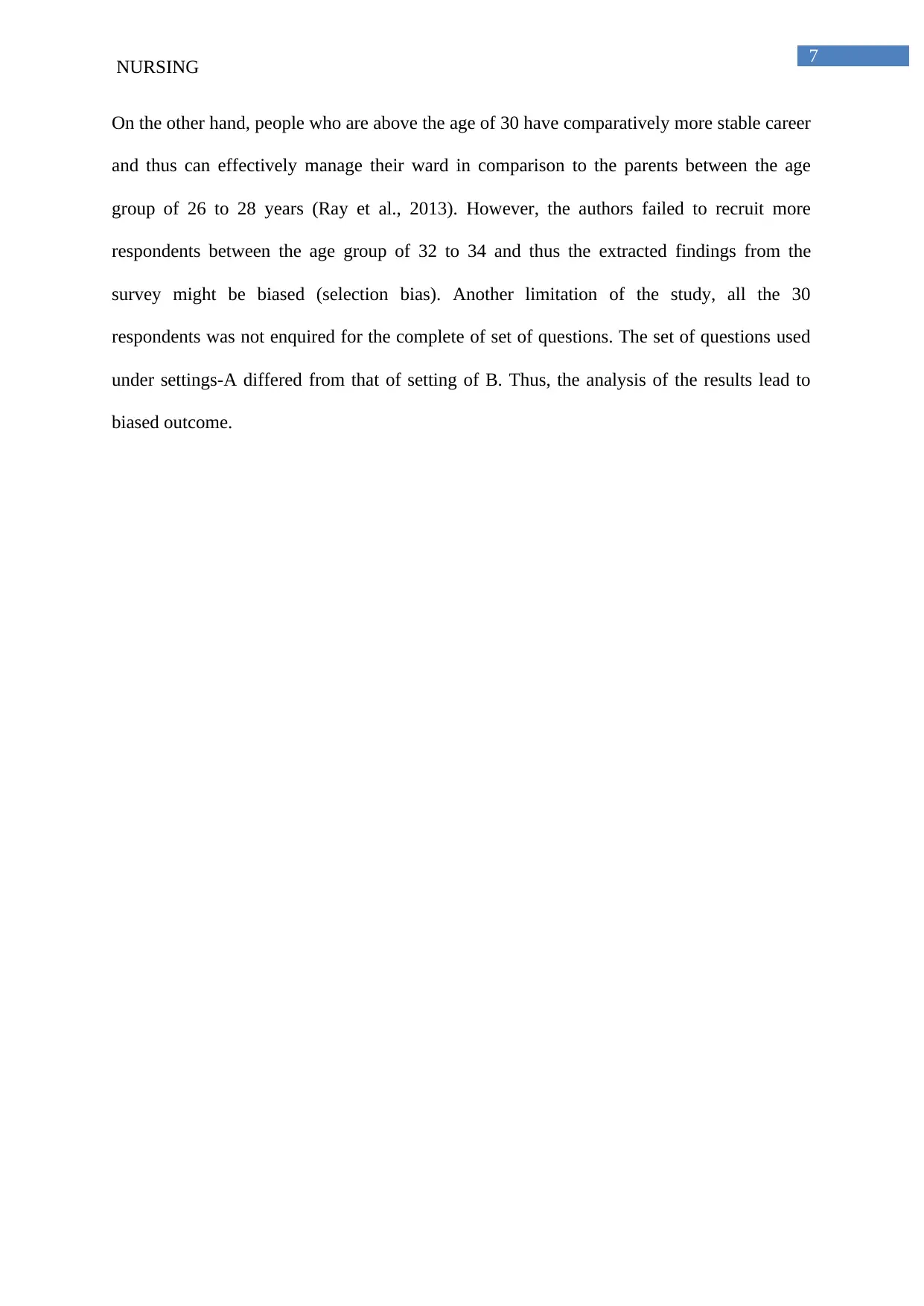
7
NURSING
On the other hand, people who are above the age of 30 have comparatively more stable career
and thus can effectively manage their ward in comparison to the parents between the age
group of 26 to 28 years (Ray et al., 2013). However, the authors failed to recruit more
respondents between the age group of 32 to 34 and thus the extracted findings from the
survey might be biased (selection bias). Another limitation of the study, all the 30
respondents was not enquired for the complete of set of questions. The set of questions used
under settings-A differed from that of setting of B. Thus, the analysis of the results lead to
biased outcome.
NURSING
On the other hand, people who are above the age of 30 have comparatively more stable career
and thus can effectively manage their ward in comparison to the parents between the age
group of 26 to 28 years (Ray et al., 2013). However, the authors failed to recruit more
respondents between the age group of 32 to 34 and thus the extracted findings from the
survey might be biased (selection bias). Another limitation of the study, all the 30
respondents was not enquired for the complete of set of questions. The set of questions used
under settings-A differed from that of setting of B. Thus, the analysis of the results lead to
biased outcome.
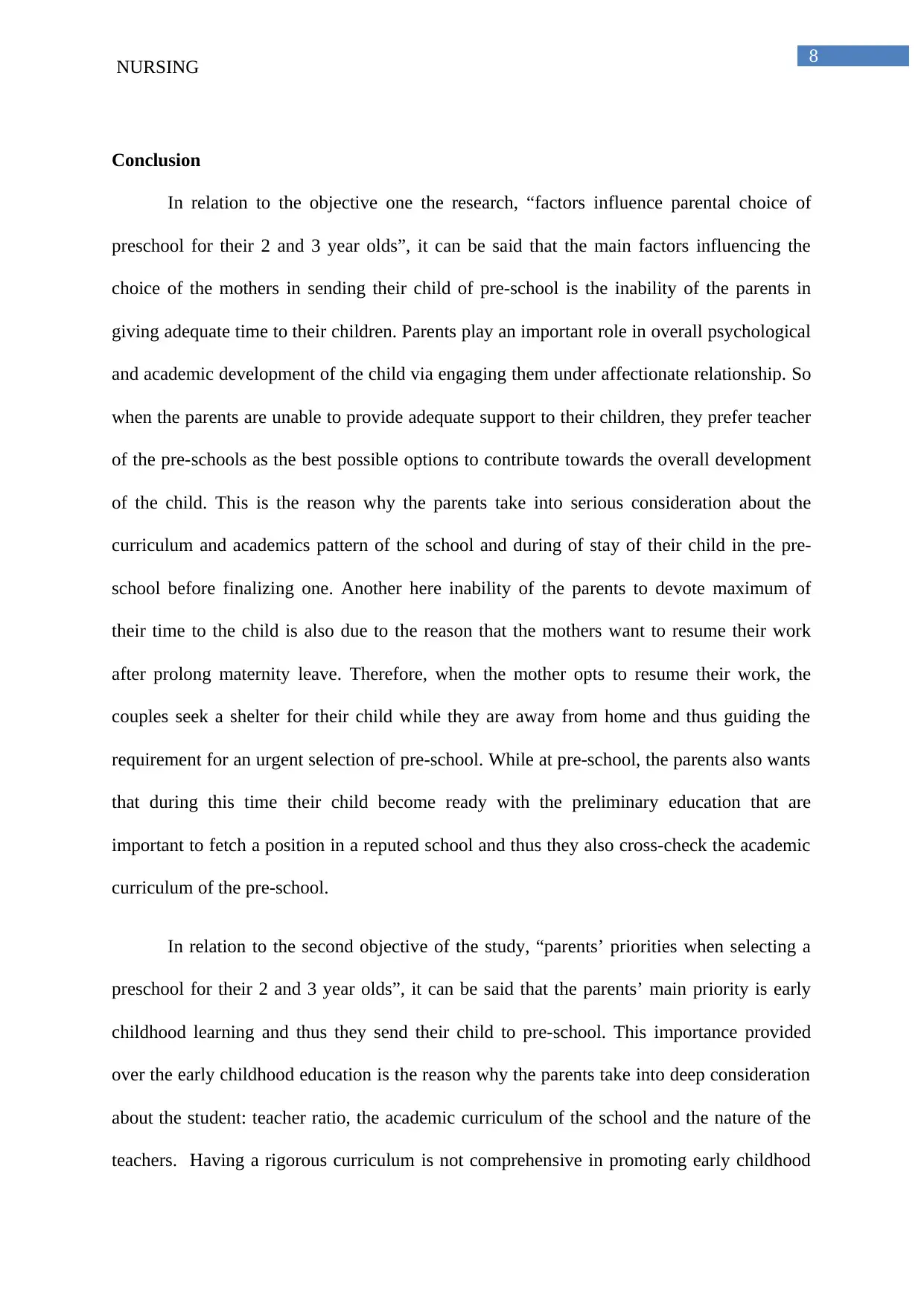
8
NURSING
Conclusion
In relation to the objective one the research, “factors influence parental choice of
preschool for their 2 and 3 year olds”, it can be said that the main factors influencing the
choice of the mothers in sending their child of pre-school is the inability of the parents in
giving adequate time to their children. Parents play an important role in overall psychological
and academic development of the child via engaging them under affectionate relationship. So
when the parents are unable to provide adequate support to their children, they prefer teacher
of the pre-schools as the best possible options to contribute towards the overall development
of the child. This is the reason why the parents take into serious consideration about the
curriculum and academics pattern of the school and during of stay of their child in the pre-
school before finalizing one. Another here inability of the parents to devote maximum of
their time to the child is also due to the reason that the mothers want to resume their work
after prolong maternity leave. Therefore, when the mother opts to resume their work, the
couples seek a shelter for their child while they are away from home and thus guiding the
requirement for an urgent selection of pre-school. While at pre-school, the parents also wants
that during this time their child become ready with the preliminary education that are
important to fetch a position in a reputed school and thus they also cross-check the academic
curriculum of the pre-school.
In relation to the second objective of the study, “parents’ priorities when selecting a
preschool for their 2 and 3 year olds”, it can be said that the parents’ main priority is early
childhood learning and thus they send their child to pre-school. This importance provided
over the early childhood education is the reason why the parents take into deep consideration
about the student: teacher ratio, the academic curriculum of the school and the nature of the
teachers. Having a rigorous curriculum is not comprehensive in promoting early childhood
NURSING
Conclusion
In relation to the objective one the research, “factors influence parental choice of
preschool for their 2 and 3 year olds”, it can be said that the main factors influencing the
choice of the mothers in sending their child of pre-school is the inability of the parents in
giving adequate time to their children. Parents play an important role in overall psychological
and academic development of the child via engaging them under affectionate relationship. So
when the parents are unable to provide adequate support to their children, they prefer teacher
of the pre-schools as the best possible options to contribute towards the overall development
of the child. This is the reason why the parents take into serious consideration about the
curriculum and academics pattern of the school and during of stay of their child in the pre-
school before finalizing one. Another here inability of the parents to devote maximum of
their time to the child is also due to the reason that the mothers want to resume their work
after prolong maternity leave. Therefore, when the mother opts to resume their work, the
couples seek a shelter for their child while they are away from home and thus guiding the
requirement for an urgent selection of pre-school. While at pre-school, the parents also wants
that during this time their child become ready with the preliminary education that are
important to fetch a position in a reputed school and thus they also cross-check the academic
curriculum of the pre-school.
In relation to the second objective of the study, “parents’ priorities when selecting a
preschool for their 2 and 3 year olds”, it can be said that the parents’ main priority is early
childhood learning and thus they send their child to pre-school. This importance provided
over the early childhood education is the reason why the parents take into deep consideration
about the student: teacher ratio, the academic curriculum of the school and the nature of the
teachers. Having a rigorous curriculum is not comprehensive in promoting early childhood
⊘ This is a preview!⊘
Do you want full access?
Subscribe today to unlock all pages.

Trusted by 1+ million students worldwide
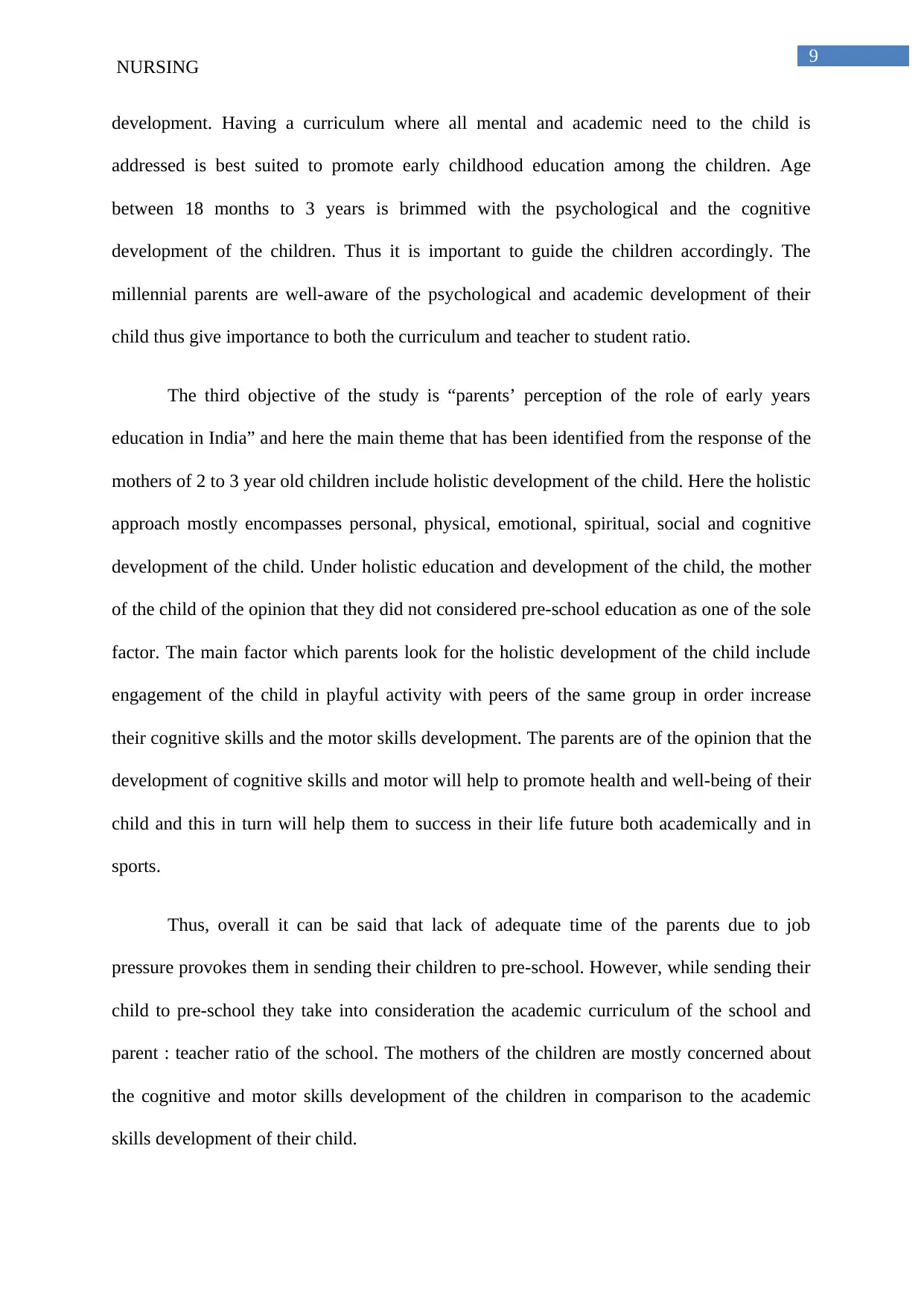
9
NURSING
development. Having a curriculum where all mental and academic need to the child is
addressed is best suited to promote early childhood education among the children. Age
between 18 months to 3 years is brimmed with the psychological and the cognitive
development of the children. Thus it is important to guide the children accordingly. The
millennial parents are well-aware of the psychological and academic development of their
child thus give importance to both the curriculum and teacher to student ratio.
The third objective of the study is “parents’ perception of the role of early years
education in India” and here the main theme that has been identified from the response of the
mothers of 2 to 3 year old children include holistic development of the child. Here the holistic
approach mostly encompasses personal, physical, emotional, spiritual, social and cognitive
development of the child. Under holistic education and development of the child, the mother
of the child of the opinion that they did not considered pre-school education as one of the sole
factor. The main factor which parents look for the holistic development of the child include
engagement of the child in playful activity with peers of the same group in order increase
their cognitive skills and the motor skills development. The parents are of the opinion that the
development of cognitive skills and motor will help to promote health and well-being of their
child and this in turn will help them to success in their life future both academically and in
sports.
Thus, overall it can be said that lack of adequate time of the parents due to job
pressure provokes them in sending their children to pre-school. However, while sending their
child to pre-school they take into consideration the academic curriculum of the school and
parent : teacher ratio of the school. The mothers of the children are mostly concerned about
the cognitive and motor skills development of the children in comparison to the academic
skills development of their child.
NURSING
development. Having a curriculum where all mental and academic need to the child is
addressed is best suited to promote early childhood education among the children. Age
between 18 months to 3 years is brimmed with the psychological and the cognitive
development of the children. Thus it is important to guide the children accordingly. The
millennial parents are well-aware of the psychological and academic development of their
child thus give importance to both the curriculum and teacher to student ratio.
The third objective of the study is “parents’ perception of the role of early years
education in India” and here the main theme that has been identified from the response of the
mothers of 2 to 3 year old children include holistic development of the child. Here the holistic
approach mostly encompasses personal, physical, emotional, spiritual, social and cognitive
development of the child. Under holistic education and development of the child, the mother
of the child of the opinion that they did not considered pre-school education as one of the sole
factor. The main factor which parents look for the holistic development of the child include
engagement of the child in playful activity with peers of the same group in order increase
their cognitive skills and the motor skills development. The parents are of the opinion that the
development of cognitive skills and motor will help to promote health and well-being of their
child and this in turn will help them to success in their life future both academically and in
sports.
Thus, overall it can be said that lack of adequate time of the parents due to job
pressure provokes them in sending their children to pre-school. However, while sending their
child to pre-school they take into consideration the academic curriculum of the school and
parent : teacher ratio of the school. The mothers of the children are mostly concerned about
the cognitive and motor skills development of the children in comparison to the academic
skills development of their child.
Paraphrase This Document
Need a fresh take? Get an instant paraphrase of this document with our AI Paraphraser
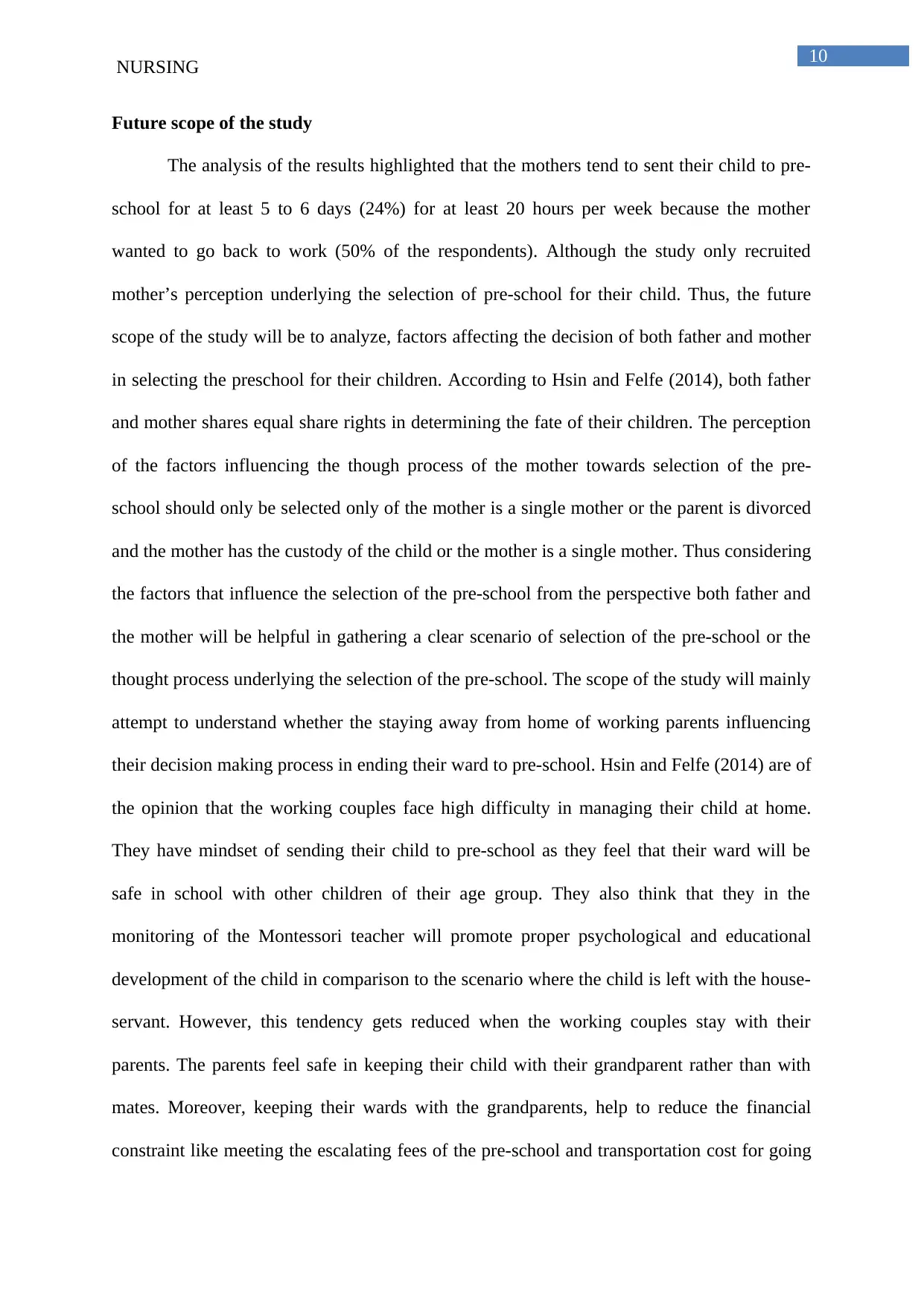
10
NURSING
Future scope of the study
The analysis of the results highlighted that the mothers tend to sent their child to pre-
school for at least 5 to 6 days (24%) for at least 20 hours per week because the mother
wanted to go back to work (50% of the respondents). Although the study only recruited
mother’s perception underlying the selection of pre-school for their child. Thus, the future
scope of the study will be to analyze, factors affecting the decision of both father and mother
in selecting the preschool for their children. According to Hsin and Felfe (2014), both father
and mother shares equal share rights in determining the fate of their children. The perception
of the factors influencing the though process of the mother towards selection of the pre-
school should only be selected only of the mother is a single mother or the parent is divorced
and the mother has the custody of the child or the mother is a single mother. Thus considering
the factors that influence the selection of the pre-school from the perspective both father and
the mother will be helpful in gathering a clear scenario of selection of the pre-school or the
thought process underlying the selection of the pre-school. The scope of the study will mainly
attempt to understand whether the staying away from home of working parents influencing
their decision making process in ending their ward to pre-school. Hsin and Felfe (2014) are of
the opinion that the working couples face high difficulty in managing their child at home.
They have mindset of sending their child to pre-school as they feel that their ward will be
safe in school with other children of their age group. They also think that they in the
monitoring of the Montessori teacher will promote proper psychological and educational
development of the child in comparison to the scenario where the child is left with the house-
servant. However, this tendency gets reduced when the working couples stay with their
parents. The parents feel safe in keeping their child with their grandparent rather than with
mates. Moreover, keeping their wards with the grandparents, help to reduce the financial
constraint like meeting the escalating fees of the pre-school and transportation cost for going
NURSING
Future scope of the study
The analysis of the results highlighted that the mothers tend to sent their child to pre-
school for at least 5 to 6 days (24%) for at least 20 hours per week because the mother
wanted to go back to work (50% of the respondents). Although the study only recruited
mother’s perception underlying the selection of pre-school for their child. Thus, the future
scope of the study will be to analyze, factors affecting the decision of both father and mother
in selecting the preschool for their children. According to Hsin and Felfe (2014), both father
and mother shares equal share rights in determining the fate of their children. The perception
of the factors influencing the though process of the mother towards selection of the pre-
school should only be selected only of the mother is a single mother or the parent is divorced
and the mother has the custody of the child or the mother is a single mother. Thus considering
the factors that influence the selection of the pre-school from the perspective both father and
the mother will be helpful in gathering a clear scenario of selection of the pre-school or the
thought process underlying the selection of the pre-school. The scope of the study will mainly
attempt to understand whether the staying away from home of working parents influencing
their decision making process in ending their ward to pre-school. Hsin and Felfe (2014) are of
the opinion that the working couples face high difficulty in managing their child at home.
They have mindset of sending their child to pre-school as they feel that their ward will be
safe in school with other children of their age group. They also think that they in the
monitoring of the Montessori teacher will promote proper psychological and educational
development of the child in comparison to the scenario where the child is left with the house-
servant. However, this tendency gets reduced when the working couples stay with their
parents. The parents feel safe in keeping their child with their grandparent rather than with
mates. Moreover, keeping their wards with the grandparents, help to reduce the financial
constraint like meeting the escalating fees of the pre-school and transportation cost for going
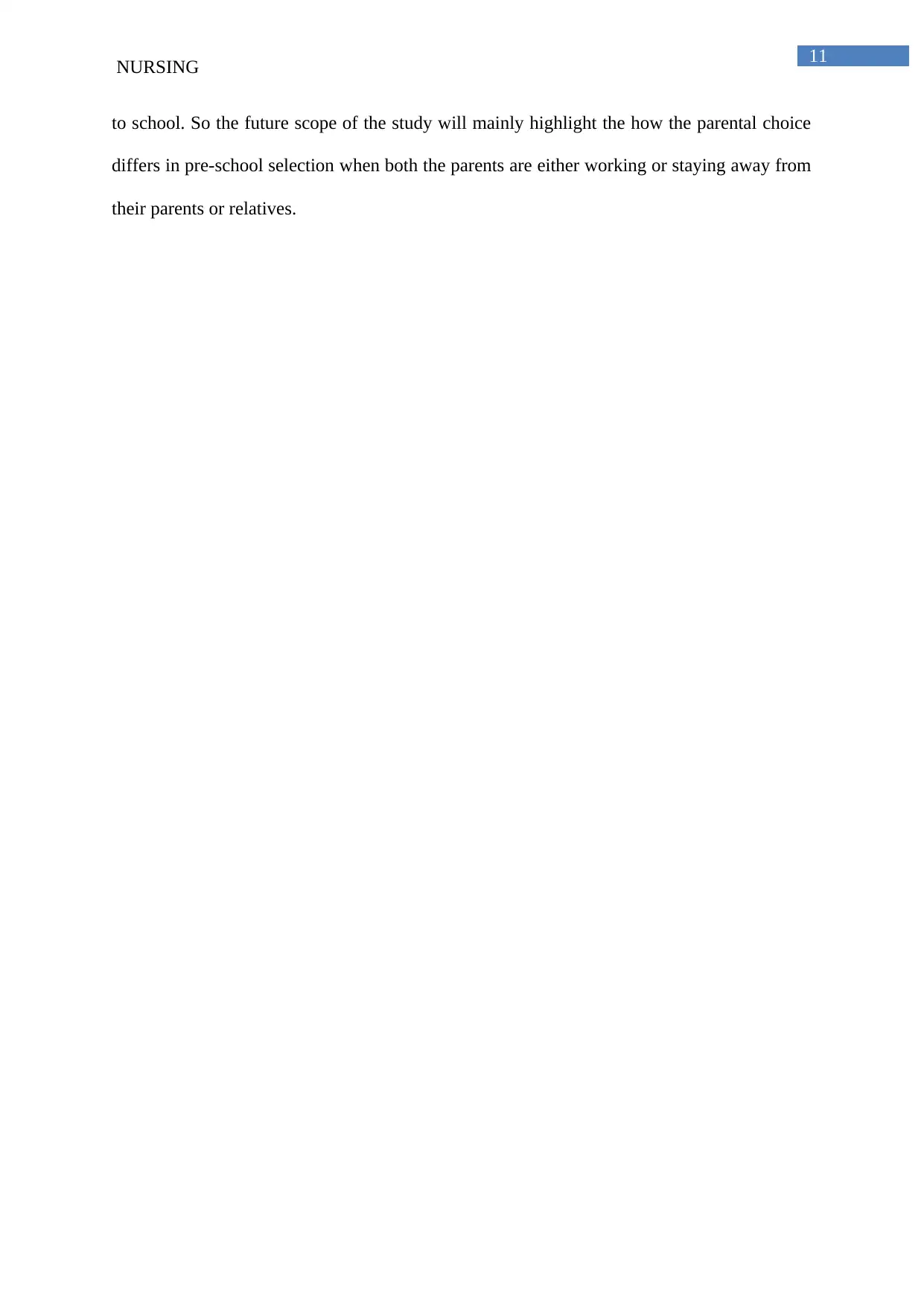
11
NURSING
to school. So the future scope of the study will mainly highlight the how the parental choice
differs in pre-school selection when both the parents are either working or staying away from
their parents or relatives.
NURSING
to school. So the future scope of the study will mainly highlight the how the parental choice
differs in pre-school selection when both the parents are either working or staying away from
their parents or relatives.
⊘ This is a preview!⊘
Do you want full access?
Subscribe today to unlock all pages.

Trusted by 1+ million students worldwide
1 out of 15
Related Documents
Your All-in-One AI-Powered Toolkit for Academic Success.
+13062052269
info@desklib.com
Available 24*7 on WhatsApp / Email
![[object Object]](/_next/static/media/star-bottom.7253800d.svg)
Unlock your academic potential
Copyright © 2020–2026 A2Z Services. All Rights Reserved. Developed and managed by ZUCOL.





